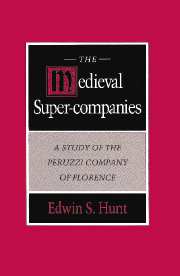Book contents
- Frontmatter
- Contents
- List of tables, figures, and map
- Introduction
- Part I Anatomy of the medieval super-company
- 1 The company and the family
- 2 The nature of the business
- 3 The structure of the Peruzzi Company
- 4 The accounting of the Peruzzi Company
- Part II History of the Peruzzi Company from its reorganization in 1300
- Conclusions
- Appendixes
- Bibliography
- Index
4 - The accounting of the Peruzzi Company
Published online by Cambridge University Press: 08 October 2009
- Frontmatter
- Contents
- List of tables, figures, and map
- Introduction
- Part I Anatomy of the medieval super-company
- 1 The company and the family
- 2 The nature of the business
- 3 The structure of the Peruzzi Company
- 4 The accounting of the Peruzzi Company
- Part II History of the Peruzzi Company from its reorganization in 1300
- Conclusions
- Appendixes
- Bibliography
- Index
Summary
The Peruzzi Company has often been cited in the long-standing controversy over the origin of double-entry accounting, and because of this it is worthwhile to digress briefly to review medieval bookkeeping systems and their relevance to the business world in which the Peruzzi and other companies operated. This review will not attempt to deal with the arcane arguments of Weber, Sombart, Schumpeter, et al. regarding the role of systematic bookkeeping in defining profit and depersonalizing business, thereby creating the essential ingredients of capitalism. These concepts not only are outside the scope of this study, but also relate to developments largely beyond the era of the super-companies. Nor will it delve into disputes, such as that between Lane and Yamey, over the influence of double-entry accounting on the transition of merchant-entrepreneurs from an itinerant to a sedentary mode of operation. The super-companies were rooted firmly in Florence as far back as can be determined and do not appear to have passed through an itinerant phase. Yet, although the importance of evolving accounting systems may have been exaggerated by some authors, the invention of a number of new techniques did take piace in the period of the super-companies and undeniably helped them evaluate and control their businesses.
Early in their histories, before the companies grew large enough to need a comprehensive system for accounting, they would have already encountered single-entry bookkeeping, also known as charge and discharge or stewardship accounting.
- Type
- Chapter
- Information
- The Medieval Super-CompaniesA Study of the Peruzzi Company of Florence, pp. 101 - 124Publisher: Cambridge University PressPrint publication year: 1994



